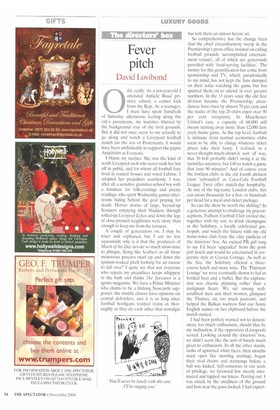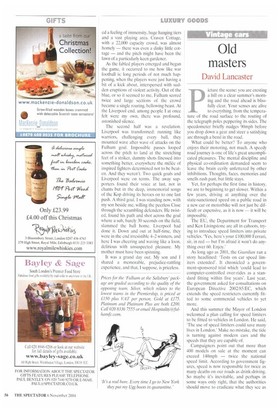The directors' box
Fever pitch
David Lovibond
0 dd, really. As a ten-year-old I attended Anfield Road primary school, a corner kick from the Kop. As a teenager, I must have spent hundreds of Saturday afternoons leering along the cit%.'s pavements, my inanities blurred by the background roar of the rival grounds. But it did not once occur to me actually to go along and watch a Liverpool football match (as the son of Protestants, it would have been unthinkable to support the papist Antichrists at Everton).
I blame my mother. She was the kind of north Liverpool snob who never took her hat off in public, and for whom all football fans lived in council houses and voted Labour. I adopted her prejudices seamlessly. I was, after all, a sensitive grammar-school boy with a fondness for folk-evenings and poetry readings, who spent Wednesday games afternoons hiding behind the goal praying for death. Horror stories of large, beered-up Scousers emptying their bladders through rolled-up Liverpool Echos and down the legs of close-pressed neighbours were more than enough to keep me from the terraces.
A couple of generations on, I may be wiser and orphaned, but I am no less squeamish: why is it that the producers of Match of the Day devote so much show-time to phlegm, flying like feathers as all those monstrous poseurs snarl up and down the sputum-soaked pitch looking for an excuse to fall over? I quite see that not everyone who rejects my prejudices keeps whippets in the bath and thinks The Spectator is a sports magazine. We have a Prime Minister who claims to be a lifelong Newcastle supporter, the middle classes have opinions on central defenders, and it is so long since football hooligans trashed trains as thoroughly as they do each other that nostalgia
has lent them an almost heroic air.
So comprehensive has the change been that the chief circumlocutory twerp in the Premiership's press office insisted on calling football grounds 'accomplished entertainment venues', all of which arc generously provided with 'food-serving facilities'. The money for this gentrification has come from sponsorship and TV, which, paradoxically to my mind, has not kept the fans slumped on their sofas watching the game but has spurred them on to attend in ever greater numbers. In the 13 years since the old first division became the Premiership, attendances have risen by almost 70 per cent and the stadia of the top 20 clubs enjoy over 90 per cent occupancy. In Manchester United's case, a capacity of 68,000 still means turning away more than 12,000 fans every home game. At the top level, football is immune from normal economics; clubs seem to be able to charge whatever ticket prices take their fancy. I realised, in a never-thought-much-about-it sort of way, that 30 bob probably didn't swing it at the turnstiles anymore, but £40 to watch a game that lasts 90 minutes? And of course even the lowliest clubs in the old fourth division (now 'rebranded' as Coca-Cola Football League Two) offer match-day hospitality. At one of the big-name London clubs, this can mean thousands for a box, or hundreds per head for a meal-and-ticket package.
So can the show be worth the shilling? In a generous attempt to challenge my preconceptions, Fulham Football Club invited me, together with my son, to drink champagne at the Salisbury, a locally celebrated gastropub, and watch the fixture with my old home-town club from the elite purlieus of the directors' box. An excited PR girl rang to say I'd been 'upgraded' from the posh pub lunch and would be entertained in corporate style at Craven Cottage. As well as the fizz, the Salisbury offered a threecourse lunch and more wine. The 'Platinum Lounge' we were eventually shown to fed us bottled beer and a buffet. But the explanation was chaotic planning rather than a malignant heart. We sat among wellscrubbed men and their women, glimpsed the Thames, ate too much pastrami, and helped the Balkan waitress find our funny English names on her clipboard before the match started.
I had been politely warned not to demonstrate too much enthusiasm, should that be my inclination, if the opposition (Liverpool) scored. Looking around the directors' box, we didn't seem like the sort of bunch much given to enthusiasm. In all the other stands, ranks of upturned white faces, their mouths stuck open like mewling starlings, began their rival chants and stampings before a ball was kicked. Self-conscious in our seats of privilege, we favoured few merely murmured and tapped our knees. Peering out, I was struck by the smallness of the ground and how neat the grass looked. I had expect
ed a feeling of immensity, huge hanging tiers and a vast playing area, Craven Cottage, with a 22,000 capacity crowd, was almost homely — there was even a dinky little cottage — and the pitch might have been the lawn of a particularly keen gardener.
As the fabled players emerged and began the game, it occurred to me how like war football is: long periods of not much happening, when the players were just having a bit of a kick about, interspersed with sudden eruptions of violent activity. Out of the blue, or so it seemed to me, Fulham scored twice and large sections of the crowd became a single roaring, bellowing beast. At the Liverpool end, among people I at once felt were my own, there was profound, astonished silence.
The second half was a revelation. Liverpool was transformed: running like warriors, challenging every ball, they mounted wave after wave of attacks on the Fulham goal. Impossible passes looped across the pitch to land at the stretching feet of a striker, dummy shots finessed into something better, everywhere the melee of inspired fighters determined not to be beaten. And they weren't. Two quick goals and Liverpool were on terms. The away supporters found their voice at last, not in chants but in the deep, immemorial songs of the Kop driving its heroes on to one last push. A third goal I was standing now, with my son beside me, willing the peerless Cisse through the scrambling defenders. He twisted, found his path and shot across the goal where a sub, barely 30 seconds on the field, slammed the ball home. Liverpool had done it, Down and out at half-time, they were in the end irresistible 4-2 winners, and here I was cheering and waving like a loon, delirious with unsuspected pleasure. My mother must have been spinning.
It was a grand day out. My son and I shared a memorable, prejudice-rattling experience, and that, I suppose, is priceless.
Prices for the 'Fulham at the Salisbury' package are graded according to the quality of the opposing team. Silver, which relates to the lowest teams in the Premiership, is priced at £150 plus VAT per person. Gold at £175. Platinum and Platinum Plus are both £200. Call 020 8336 7555 or email HospitalityCcifulhamfc.com.



























































































































 Previous page
Previous page